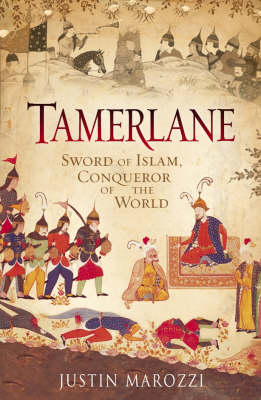
Tamerlane
Sword of Islam, Conqueror of the World
Seiten
2004
HarperCollins Publishers Ltd (Verlag)
978-0-00-711611-9 (ISBN)
HarperCollins Publishers Ltd (Verlag)
978-0-00-711611-9 (ISBN)
- Titel ist leider vergriffen;
keine Neuauflage - Artikel merken
A powerful account of the life of Tamerlane the Great (1336-1405), the last master nomadic power, one of history's most extreme tyrants ever, and subject of Marlowe's play. Marozzi travelled in the footsteps of the great Mogul Emperor of Samarkland to write this book which is part history, part travelogue.
A powerful account of the life of Tamerlane the Great (1336-1405), the last master nomadic power, one of history's most extreme tyrants ever, and subject of Marlowe's play. Marozzi travelled in the footsteps of the great Mogul Emperor of Samarkland to write this wonderful book which is part history, part travelogue. The name of the last great warlord immediately conjures up images of mystery and romance: medieval wafare on desert plains; the clash of swords on snow-clad mountain; the charge of elephants across the steppes of Asia; the legendary opulence and cruelty of the illiterate, chess-playing nemesis of Asia. He ranks alongside Alexander as one of the world's great conquerors, yet the details of his life are scarcely known in the West. He was not born to a distinguished family, nor did he find his apprenticeship easy -- at one point his mobile army consisted only of himself, his wife, seven companions and four horses -- but his dominion grew with astonishing rapidity. In the last two decades of the fourteenth century and the beginning of the fifteenth, he blazed through Asia.
Cities were razed to the ground, inhabitants tortured without mercy, sometimes enemies were buried alive -- more commonly they were decapitated. On the ruins of Baghdad, Tamerlane had his princes erect a pyramid of 90,000 heads. During his lifetime he sought to foster a personal myth, exaggerating the difficulties of his youth, laying claim to supernatural powers and a connection to Genghis Khan. This myth was maintained after his death in legend, folklore, poetry, drama and even opera, nowhere more powerfully than in Marlowe's play -- he is now as much a literary construct as a historical figure. Tamerlane and his armies swept through country after country, sacking great cities and imposing his order on the vast steppes of Asia. Justin Marozzi follows in his path and evokes his legacy in telling the tale of this fabulously cruel, magnificent and romantic warrior.
A powerful account of the life of Tamerlane the Great (1336-1405), the last master nomadic power, one of history's most extreme tyrants ever, and subject of Marlowe's play. Marozzi travelled in the footsteps of the great Mogul Emperor of Samarkland to write this wonderful book which is part history, part travelogue. The name of the last great warlord immediately conjures up images of mystery and romance: medieval wafare on desert plains; the clash of swords on snow-clad mountain; the charge of elephants across the steppes of Asia; the legendary opulence and cruelty of the illiterate, chess-playing nemesis of Asia. He ranks alongside Alexander as one of the world's great conquerors, yet the details of his life are scarcely known in the West. He was not born to a distinguished family, nor did he find his apprenticeship easy -- at one point his mobile army consisted only of himself, his wife, seven companions and four horses -- but his dominion grew with astonishing rapidity. In the last two decades of the fourteenth century and the beginning of the fifteenth, he blazed through Asia.
Cities were razed to the ground, inhabitants tortured without mercy, sometimes enemies were buried alive -- more commonly they were decapitated. On the ruins of Baghdad, Tamerlane had his princes erect a pyramid of 90,000 heads. During his lifetime he sought to foster a personal myth, exaggerating the difficulties of his youth, laying claim to supernatural powers and a connection to Genghis Khan. This myth was maintained after his death in legend, folklore, poetry, drama and even opera, nowhere more powerfully than in Marlowe's play -- he is now as much a literary construct as a historical figure. Tamerlane and his armies swept through country after country, sacking great cities and imposing his order on the vast steppes of Asia. Justin Marozzi follows in his path and evokes his legacy in telling the tale of this fabulously cruel, magnificent and romantic warrior.
Justin Marozzi is contributing editor of the Spectator. He used to sell tobacco to Libya and was the Financial Times's correspondent in the Philippines for two years. He writes regularly for the Financial Times and has also written for The Times and The Economist and broadcast for the BBC World Service and Radio Four. He is the author of South from Barbary, an account of a journey along the old slave routes of the Libyan Sahara.
| Erscheint lt. Verlag | 2.8.2004 |
|---|---|
| Zusatzinfo | (16pp colour plate section) |
| Verlagsort | London |
| Sprache | englisch |
| Maße | 159 x 240 mm |
| Gewicht | 806 g |
| Themenwelt | Reisen ► Reiseberichte ► Naher Osten |
| Reisen ► Reiseberichte ► Asien | |
| Geschichte ► Allgemeine Geschichte ► Mittelalter | |
| Geschichte ► Allgemeine Geschichte ► Neuzeit (bis 1918) | |
| Geisteswissenschaften ► Geschichte ► Regional- / Ländergeschichte | |
| ISBN-10 | 0-00-711611-X / 000711611X |
| ISBN-13 | 978-0-00-711611-9 / 9780007116119 |
| Zustand | Neuware |
| Haben Sie eine Frage zum Produkt? |
Mehr entdecken
aus dem Bereich
aus dem Bereich
eine neue Geschichte des Mittelalters
Buch | Hardcover (2023)
C.H.Beck (Verlag)
CHF 53,20


